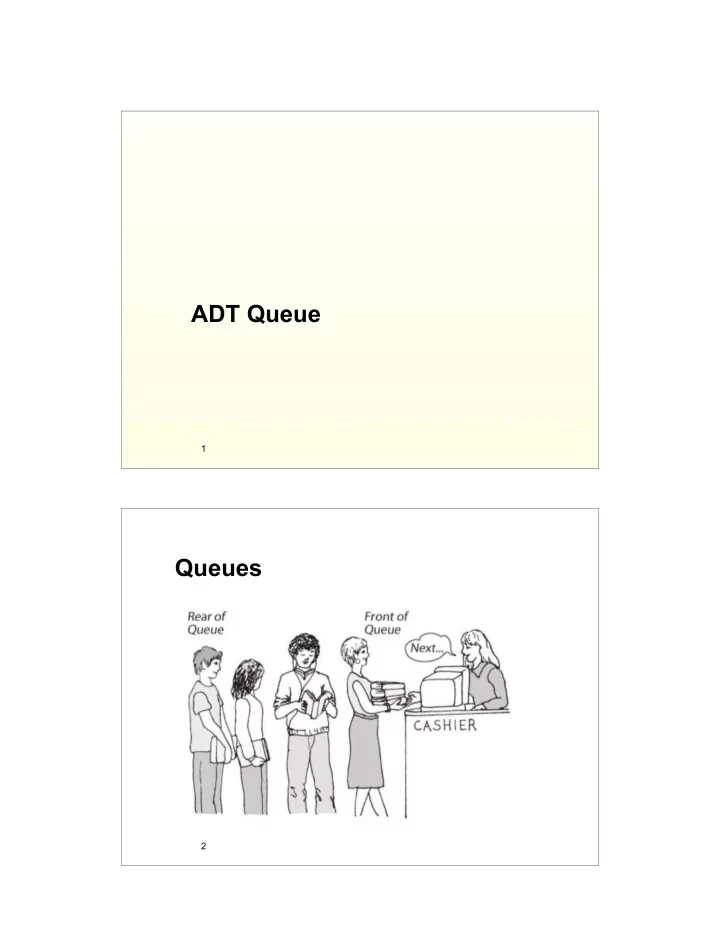

ADT Queue 1 Queues 2
Queue of cars 3 Queue at logical level • A queue is an ADT in which elements are added to the rear and removed from the front • A queue is a FIFO “last in, first out” structure. 4
Queue at Logical Level • What operations would be appropriate for a queue? 5 Stack Operations Transformers • MakeEmpty change state • Enqueue • Dequeue Observers observe state • IsEmpty • IsFull 6
Queue at Application Level • For what types of problems would be queue be useful for? • various servers that serve requests in First Come First Serve order: • printer server (a queue of print jobs), • disk driver (a queue of disk input/output requests) • CPU scheduler (a queue of processes waiting to be executed) 7 Queue: Logical level 8
Array-based Implementation 9 Array-based Implementation • An array with the front queue always in the first position Enqueue A, B, C, D: Dequeue: need to shift all items Dequeue() is inefficient: it takes time linear to queue length to move all elements forward 10
Array-based Implementation • An array with the front floats 11 What if we enqueue X, Y and Z? Array-based Implementation • An array with the front floats, circular array How to wrap around? 12 (rear+1) % 5
Need to differentiate! sol: Array-based Implementation * add a length member * reserve an empty slot Empty Queue Full Queue 13 Array-based Implementation • An array with front indicate the slot before the front item, and this slot doest not store anything) Empty queue: front==rear Full queue: front==rear+1 14
Array-based Implementation private: int front; // index of front element -1 int rear; //index of queue rear element int maxQue; //size of array ItemType * items; }; 15 Array-based implementation QueType::QueType(int max=500) // Parameterized class constructor // Post: maxQue, front, and rear have been initialized. // The array to hold the queue elements has been dynamically // allocated. { maxQue = max + 1; front = maxQue - 1; rear = maxQue - 1; items = new ItemType[maxQue]; } 16
Array-based implementation QueType::~QueType() // Parameterized class constructor // Post: maxQue, front, and rear have been initialized. // The array to hold the queue elements has been dynamically // allocated. { delete [] items; } 17 Array-based implementation void QueType::Enqueue(ItemType newItem) // Post: If (queue is not full) newItem is at the rear of the queue; // otherwise a FullQueue exception is thrown. { if (IsFull()) throw FullQueue(); else { rear = (rear +1) % maxQue; items[rear] = newItem; } } 18
Array-based implementation void QueType::Dequeue(ItemType& item) // Post: If (queue is not empty) the front of the queue has been // removed and a copy returned in item; // othersiwe a EmptyQueue exception has been thrown. { if (IsEmpty()) throw EmptyQueue(); else { front = (front + 1) % maxQue; item = items[front]; } } 19 Array-based implementation bool QueType::IsEmpty() const // Returns true if the queue is empty; false otherwise. { return (rear == front); } bool QueType::IsFull() const // Returns true if the queue is full; false otherwise. { return ((rear + 1) % maxQue == front); } 20
Linked-Structure implementation of Queue How do you define the data member of Queue? 21 Linked-Structure implementation of Queue 22
Linked-Structure implementation of Queue 23
Recommend
More recommend